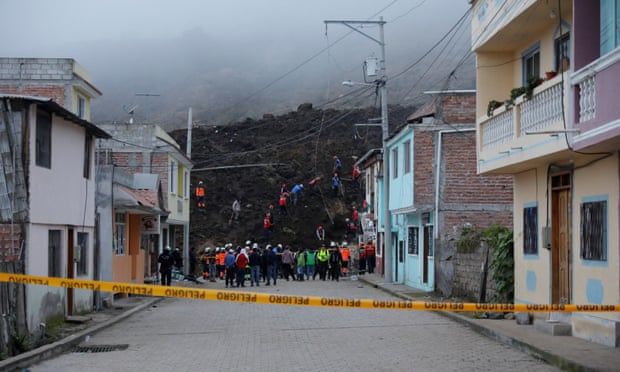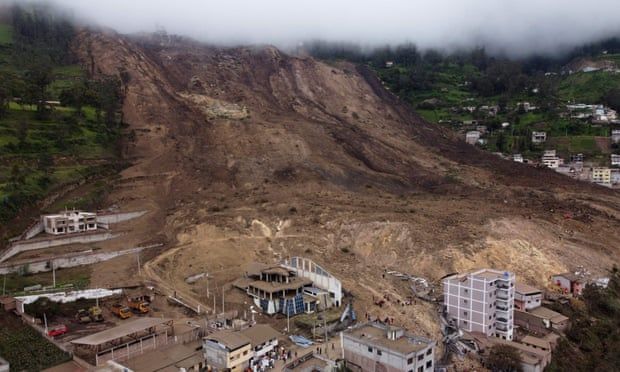President Guillermo Lasso confirms seven people have died, with 62 still missing after disaster on Sunday night
A huge landslide that swept over an Andean community in central Ecuador, burying dozens of homes, has killed at least seven people, authorities said as rescuers continued a frantic search for survivors.
Earlier on Monday, officials had reported 16 deaths, but President Guillermo Lasso put the confirmed toll at seven as he arrived on Monday night at the scene of the disaster in Alausí, about 137 miles south of the capital, Quito. Officials also raised the number of people reported missing to 62.
Lasso lamented the tragedy and promised people in the town that rescuers would continue working on the search effort.
Ecuador’s risk management secretariat said more than 30 people had been rescued after the mountainside collapsed at about 10pm on Sunday. It said 23 people were injured.
“My mother is buried”, said Luis Ángel González, 58, who had also lost other family members. “I am so sad, devastated. There is nothing here, no houses, no anything. We are homeless [and] without family.”
 Rescuers dig amid debris as they look for survivors.
Rescuers dig amid debris as they look for survivors.
The risk management agency estimated that 500 people and 163 homes had been affected by the disaster, which also destroyed a portion of the Pan-American Highway.
The governor of Chimborazo, Ivan Vinueza, told the Associated Press that some of the injured had been taken to area hospitals. He said officials had urged people to evacuate the area after landslides and cracks began to develop about two months ago. Some had followed the advice, and on Saturday, as tremors intensified, others fled.
Area residents told local media they had heard tremors on the mountain before the landslide, which was estimated to be about 150 metres (490ft) wide and nearly 700 metres long. It swept away trees, homes and other buildings. More than 50 houses were buried under mud and debris.
The emergency response agency said 60% of potable water service in the area had been affected. The presidential office said some schools would be switching to online classes.
Firefighters from nearby cities were dispatched to the area to help. Rescuers focused on the flanks of the landslide where they found traces and debris of houses.
 An aerial view of the landslide.
An aerial view of the landslide.
Alberto Escobar, a rescuer and paramedic, said it was unlikely more survivors would be found because of the time that had elapsed. However, he said the search would continue as long as it did not rain.
Video from cameras connected to the country’s emergency service network showed people fleeing their homes with help from neighbours. It also showed people transporting appliances and other belongings in vehicles.
Among the survivors housed in temporary shelters was the Zuña family, who were staying at the Iglesia Matriz de Alausí, where rooms for catechism or parish meetings were adapted with bunk beds days ago after authorities declared an emergency in the area because of the risk of landslides.
Sonia Guadalupe Zuña said her mother had been reluctant to leave what they had built over the years. “We went to the shelter, but my mother didn’t want to,” Zuña said. “Later, my daughter went to convince her. When they walked along the rails, everything collapsed. They arrived covered in dirt and crying.”
Save for the clothes they had on, Zuña’s family lost everything. “I don’t know where, but we’re all leaving,” she said crying. “My parents taught us that by working hard, you get material things, but being together is priceless.”















